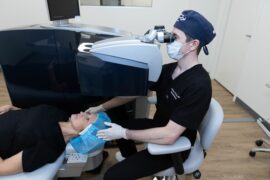Eye Care, Eye Health, LASIK, Surgery

LASIK (Laser-Assisted In Situ Keratomileusis) is a popular refractive surgery designed to correct vision problems such as myopia (nearsightedness), hyperopia (farsightedness), and astigmatism. While the procedure offers freedom from glasses and contact lenses, not everyone is a suitable candidate. Here is a detailed look at the criteria that determine LASIK eligibility.
Age Requirements: “18 to Cataract”
With rare exceptions, patients must be at least 18 years old to qualify for LASIK. While 18 is the FDA-approved minimum age, some patients must wait longer to ensure their prescription is no longer changing. LASIK has no upper age limit, but once patients develop visually significant cataracts (often in their mid-sixties or later), cataract surgery is usually the more suitable option. However, after cataract surgery, many patients still undergo LASIK to correct residual glasses prescription.
Stable Vision
A crucial factor in determining LASIK candidacy is having a stable contacts or glasses prescription. Your sphere and cylinder should change no more than 0.5 diopters in the twelve months preceding LASIK because we don’t want to perform surgery on a moving target. Check out our previous blog to learn how to interpret your glasses prescription and discover if your vision is stable enough to undergo LASIK.
Prescription Range
LASIK is effective for a specific range of prescriptions. Note that the range below may vary slightly depending on your surgeon’s laser platform.
- Up to -12.00 diopters for myopia.
- Up to +6.00 diopters for hyperopia
- Up to 6.00 diopters for astigmatism
Patients with prescriptions outside these ranges might not achieve optimal results with LASIK alone and may need to consider alternative procedures.
Corneal Thickness
The thickness of the cornea is another critical factor. LASIK involves reshaping the cornea, so it needs to be thick enough to allow for this reshaping without compromising its integrity. Patients with thin corneas might be at risk for complications and may be advised to consider other types of refractive surgery, such as PRK (Photorefractive Keratectomy). Patients need at least 250 micrometers (one-quarter of a millimeter) of untouched corneal tissue after surgery, and many surgeons aim for 300 micrometers for extra security.
Eye Health
Good overall eye health is essential for LASIK candidates. Conditions such as severe dry eye, cataracts, glaucoma, or active eye infections can disqualify a patient from undergoing LASIK. These conditions can affect healing and the overall success of the surgery.
General Health
Certain systemic health conditions can impact LASIK candidacy. For instance, unstable autoimmune diseases, uncontrolled diabetes, and tobacco use can pose risks to surgical healing. Additionally, patients should not be pregnant or nursing, as hormonal changes can affect vision stability and healing.
Realistic Expectations
Having realistic expectations about the outcomes of LASIK is crucial. While LASIK has a high success rate, it is important to understand its limitations. Some patients might still need to wear glasses or contact lenses for certain activities, and there is a possibility of needing a follow-up procedure.
SMILE, PRK, and Other Options
Most of the above criteria also apply to other types of laser eye surgery, including SMILE and PRK. Some patients may not qualify for laser eye surgery but would be better suited for an implantable collamer lens (ICL) or refractive lens exchange (RLE). Read our previous blog to discover which of these surgeries is best suited for your eyes.
Conclusion
Qualifying for LASIK involves meeting several criteria related to age, vision stability, prescription range, corneal thickness, and overall eye and general health. A thorough evaluation by an experienced ophthalmologist is essential to determine if LASIK is the right choice for you. Understanding these requirements and having realistic expectations can help ensure a successful outcome and a clearer vision for the future.
Want to learn more? Follow us on Instagram and Facebook @corsinilasereye.
Want to know if you qualify for LASIK? Call our clinic at 484-580-2166 for a free consultation.
Thanks for reading!
Jonathan Corsini, MD


